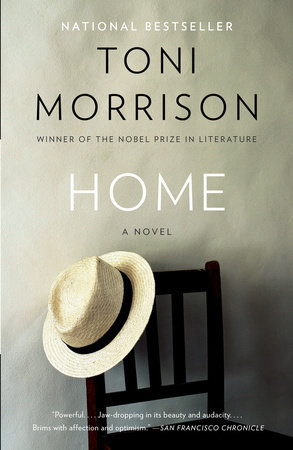Gary Raymond delves into the tenth novel by Toni Morrison, Home.
Often referred to as America’s unofficial official national novelist, Toni Morrison carries in her prose not just the weight of the story she is telling, but the weight of the nation she represents. More than any other American novelist Morrison stands for something profoundly, shamefully embedded in the psyche of the nation.
As America took its first steps emerging from the shadows of its segregated past, Morrison published her first novel, The Bluest Eye (1970). A powerful debut, it explored themes of guilt, incestuous rape, and self-
 In this novel we are in the troubled company of Frank Money, 24-
In this novel we are in the troubled company of Frank Money, 24-
But that also means that Morrison’s work is of a type, and with Home, her tenth novel, she is beginning to look as if she is addressing the same theme in the same way. In Home, for instance, for all the progress of Frank, the novel never feels like it is looking forward. And to this effect, ironically, it is quite easy to envisage Frederick Douglass as a character in a Toni Morrison novel, but not the current president.
Morrison has written only one great book since her Nobel Prize and that was her last, A Mercy (2008), which reached back as far as she has yet gone in the nation’s historical path. For Home, Morrison goes back only as far as the Korean war, but we are in familiar territory thematically. The issue here is that the drama of the book is hard-
‘How small, how useless was her schooling, she thought, and promised herself she would find time to read about and understand “eugenics”’
It is a heart-
But, for such a slight book, this moment stands out as achieving what Morrison is capable of achieving. And so when Frank trudges from grubby injustice to grubby injustice the scenes feel decidedly underdone. The story is told through clipped, Old Testament prose that holds tightly to the lowly parade of central characters and it is worth noting that Morrison has often been criticised for the cold symbolism of her characters, their lack of depth. But she is sometimes equally presenting a people, working in allegory, which, although a dangerous game for a novelist, can obviously have a profound result.
Morrison, unlikely to be resting on her laurels, seems intent on her duty as beacon for a story which must continue to be told over and over again. Whether she will be tempted at some point to tell a story sprinkled with the light of Obama, or at least touch that universe, will have to be seen. She did, after all, read at his inauguration, the standard-


 Enjoyed this article? Support our writers directly by buying them a coffee and clicking this link.
Enjoyed this article? Support our writers directly by buying them a coffee and clicking this link.







